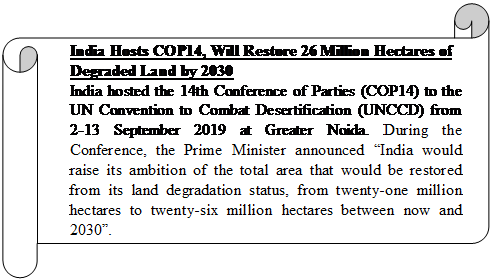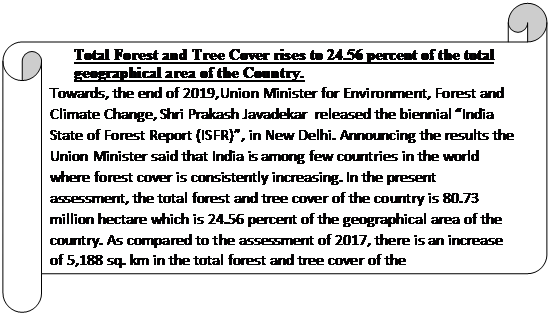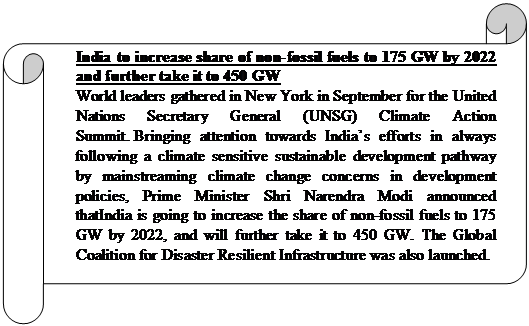Ministry of Environment, Forest and Climate Change
Year End Review: Ministry of Environment, Forest and Climate Change
India to increase share of non-fossil fuels to 175 GW by 2022 and further take it to 450 GW
India Hosts key UN summit on desertification, To Restore 26 Million Hectares of Degraded Land by 2030
Tiger count in India rises to 2967
Total Forest and Tree Cover rises to 24.56 percent
Posted On:
31 DEC 2019 1:02PM by PIB Delhi
India’s leadership and commitment on environmental issues under the guidance of Prime Minister Shri Narendra Modi has led to landmark achievements. With significant developments such as India for the first time ranking among the top ten countries in the Climate Change Performance Index (CCPI) goes further to prove that all efforts and activities being currently undertaken by the country under the Ministry of Environment, Forest and Climate Change (MoEF&CC) are setting a tone of vast improvements.
Some of the major highlights of the Ministry in the year 2019 are outlined below:-
Environment:
· Air pollution is one of the biggest global environmental challenges of today. A time bound national level strategy for pan India implementation to tackle the increasing air pollution problem across the country in a comprehensive manner in the form of National Clean Air Programme (NCAP) was launched on 10th January, 2019.
· Third Indo-German Environment Forum with the theme "Cleaner Air, Greener Economy:" held in New Delhi in February. The one-day event through panel discussions and parallel sessions focused on challenges, solutions and necessary framework conditions of air pollution control, waste management and circular economy as well as implementation of NDCs and SDGs based on Paris Agreement and Agenda 2030 of UN respectively.
· In a significant first, India piloted resolutions on two important global environment issues relating to Single-use Plastics and Sustainable Nitrogen management at the fourth session of United Nations Environment Assembly (UNEA) which was held in Nairobi from 11th to 15th March 2019.UNEA adopted both the resolutions with consensus.
· India Cooling Action Plan (ICAP) Launched in March this year. India is one of the first countries in the world to develop a comprehensive Cooling Action plan which has a long term vision to address the cooling requirement across sectors and lists out actions which can help reduce the cooling demand. Cooling requirement is cross sectoral and an essential part for economic growth and is required across different sectors of the economy such as residential and commercial buildings, cold-chain, refrigeration, transport and industries.
· In order to strengthen the implementation of environmentally sound management of hazardous waste in the country, the Ministry amended the Hazardous and Other Wastes (Management & Transboundary Movement) Rules, 2016 vide notification G.S.R. G.S.R. XX (E), dated 01 March 2019. The amendment has been done keeping into consideration the “Ease of Doing Business” and boosting “Make in India” initiative by simplifying the procedures under the Rules, while at the same time upholding the principles of sustainable development and ensuring minimal impact on the environment.
· On World environment Day, Union Minister for Environment, Forest and Climate Change, Shri Prakash Javadekar launched a people’s campaign #SelfiewithSapling urging all to join and plant a sapling and post the selfie with the sapling on social media. Shri Javadekar stressed that ‘Jan Bhagidari’ is integral towards tackling the environmental issues and environment protection has to be a people’s movement.
India Hosts COP14, Will Restore 26 Million Hectares of Degraded Land by 2030
India hosted the 14th Conference of Parties (COP14) to the UN Convention to Combat Desertification (UNCCD) from 2-13 September 2019 at Greater Noida. During the Conference, the Prime Minister announced “India would raise its ambition of the total area that would be restored from its land degradation status, from twenty-one million hectares to twenty-six million hectares between now and 2030”.
|

The country has leapfrogged from Bharat Standard IV to Bharat Standard VI for vehicle emission norms and from 1st April 2020, vehicles will be BS VI compliant. There is also a strong push for use of e-vehicles by introducing multiple policy interventions and incentives.
Forest & Wildlife:
· A Memorandum of Understanding (MoU) was signed in February between MoEF&CC and University of British Columbia (UBC), Canada for next 10 years in New Delhi. Both the institutions shall explore opportunities for future collaborations in the field of forestry science through their respective organizations namely Indian Council of Forestry Research and Education, Wildlife Institute of India, Forest Survey of India, Indira Gandhi National Forest Academy and Directorate of Forest Education, Dehradun, Uttarakhand, India and University of British Columbia, Vancouver, Canada.
· A dedicated“Asiatic Lion Conservation Project” with a budgetary contribution of Rs 97.85 Cr from Central Government was launched in February . The Asiatic Lion endemic to Gir landscape of Gujarat, is one of the 21 critically endangered species identified by the Ministry for taking up recovery programmes.
· ‘Not all animals migrate by choice’ campaign launched to raise awareness on illegal wildlife trade.
Tigers count in India rise to 2967, in 2018
On the occasion of International Tiger Day, Prime Minister Shri Narendra Modi released the results of the fourth cycle of All India Tiger Estimation - 2018 in New Delhi on July 29th, 2019. The count of tigers in India has risen to 2967, in 2018, according to this census.
|
Total Forest and Tree Cover rises to 24.56 percent of the total geographical area of the Country.
Towards, the end of 2019,Union Minister for Environment, Forest and Climate Change, Shri Prakash Javadekar released the biennial “India State of Forest Report (ISFR)”, in New Delhi. Announcing the results the Union Minister said that India is among few countries in the world where forest cover is consistently increasing. In the present assessment, the total forest and tree cover of the country is 80.73 million hectare which is 24.56 percent of the geographical area of the country. As compared to the assessment of 2017, there is an increase of 5,188 sq. km in the total forest and tree cover of the
|
| |
|
|
|
| |
 |
| |
| |
|
 |
· In a major boost towards promoting afforestation and achieving green objectives of the country, the Ministry handed over Rs.47,436 crores of Compensatory Afforestation Fund anagement and Planning Authority, CAMPA funds to various states in August. Important activities on which the fund will be utilised will be for the Compensatory Afforestation, Catchment Area Treatment, Wildlife Management, Assisted Natural Regeneration, Forest Fire Prevention and Control Operations, Soil and Moisture Conservation Works in the forest, Improvement of Wildlife Habitat, Management of Biological Diversity and Biological Resources, Research in Forestry and Monitoring of CAMPA works etc.
· With efforts towards protecting and conserving Snow Leopards, the First National Protocol on Snow Leopard Population Assessment in India was launched on the occasion of International Snow Leopard Day in October.
· Draft amendment to the Indian Forests Act withdrawn to remove any misgivings, thereby enriching the livelihood of tribals and forest dwellers.
Climate Change:
· A publication released in February on climate actions in India titled “India – Spearheading Climate Solutions”. This publication “India – Spearheading Climate Solutions” mentions the key actions India has taken under various sectors towards combating and adapting to climate change.
· India CEO Forum on Climate Change was organized, as the pioneering initiative of the government, inviting industry representatives, exchanged views on climate change issues and discussed opportunities to collaborate in regard to fulfilling India’s national as well as international climate change commitments.
India to increase share of non-fossil fuels to 175 GW by 2022 and further take it to 450 GW
World leaders gathered in New York in September for the United Nations Secretary General (UNSG) Climate Action Summit. Bringing attention towards India’s efforts in always following a climate sensitive sustainable development pathway by mainstreaming climate change concerns in development policies, Prime Minister Shri Narendra Modi announced thatIndia is going to increase the share of non-fossil fuels to 175 GW by 2022, and will further take it to 450 GW. The Global Coalition for Disaster Resilient Infrastructure was also launched.
|

New leadership group announced in September at Climate Action Summit to drive industry transition to low-carbon economy.
India at COP 25, Calls upon more countries to join the International Solar Alliance (ISA)
The 25th Session of the Conference of the Parties (COP 25) to the United Nations Framework Convention on Climate Change (UNFCCC) was held under the Presidency of Chile in Madrid, Spain on 02nd – 15th December 2019.Some of the Key issues discussed at COP25 werePre-2020 implementation and ambition gaps, Article 6 under the Paris Agreement, Enhanced Transparency Framework (Monitoring, Reporting and Verification), Warsaw International Mechanism (WIM) for Loss and Damage associated with Climate Change Impacts, Adaptation related matters where in India has been stressing on parity between mitigation and adaptation and Technology development and transfer.At COP25, India also called upon more countries to join the International Solar Alliance (ISA) to reduce dependence on fossil fuels to meet the growing energy requirement, even as it acknowledged the phenomenal progress made by the Alliance and the growing solar energy capabilities the world over.
Other Key initiatives / activities undertaken by the Ministry
· In order to boost the investment in wind power projects and help in providing wind power at cheaper rate, a conscious decision to relax the condition of charging the lease rent of Rs. 30,000/- per MW for wind power projects was made in August.
· Brazil, South Africa, India and China, BASIC countries held its 28th Ministerial meeting on Climate Change from 14th to 16th August in Sao Paulo, Brazil, where in India participated.
· Brazil, Russia, India, China and South Africa,BRICS Nations come together for Urban Environmental Management in Sao Paulo, Brazil in August, where it was agreed upon to work together to resolve the multifaceted environmental issues faced by BRICS cities.
· India hosted the Second Lead Author Meeting of the Intergovernmental Panel on Climate Change (IPCC) Working Group III Sixth Assessment Report at New Delhi, beginning 30th September to 4th October 2019.
· The proposal was approved for setting-up of a New Regional Centre of the GB Pant Institute of Himalayan Environment & Development at Ladakh.
· In a first, a four-day long Ministry of Environment, Forest and Climate Change, MoEF&CC & Centre for Media Studies (CMS) VATAVARAN-2019 Short Film Competition and Festival on Environment was held. Range of discussions, seminars, workshops, interactions were organized to churn innovative ideas, paving a path for new talents and creative minds in the stream of film making with a sense of responsibility towards the Environment.
· A Memorandum of Understanding between the Government of the Republic of India represented by the Ministry of Environment, Forest and Climate Change and the Government of Switzerland represented by the Federal Department of Foreign Affairs on Technical Cooperation in the field of Climate Change and Environment was signed on 13.09.2019. The MoU will remain in effect for a five-year period, and may be renewed for similar periods, as agreed upon by the Parties. The MoU identifies several areas of cooperation including capacity building on Climate Change and sustainable water management; sustainable forest management; sustainable development of mountainous regions; environmentally sustainable and resilient urban development; air, land and water pollution; clean and renewable energy and climate change risk management.
· To strive to make our beaches clean and create awareness amongst citizens about the importance of coastal ecosystems, the Ministry undertook a mass cleanliness-cum-awareness drive in 50 identified beaches under the “Swachh – Nirmal Tat Abhiyaan”, from 11th -17thNovember, 2019. The identified beaches were in 10 coastal States/Union Territories (UTs) namely Gujarat, Daman & Diu, Maharashtra, Goa, Karnataka, Kerala, Tamil Nadu, Puducherry, Andhra Pradesh, and Odisha. The beaches were identified after the consultation with the States/UTs.
· Promoting the use of environmentally friendly products, the Ministry in November gave Environment Clearance to Indian Oil Corporation Limited (IOCL) to set up new 2G Ethanol plant at Panipat. It is also pertinent to highlight that it was declared that no separate environmental clearance was required to produce additional ethanol from B-heavy molasses as it does not contribute to the pollution load, giving further benefits to farmers and the sugar industry.
· In another first, Annual Meet of the State Nodal Agencies implementing the National Green Corps ‘Ecoclub’ programme of MoEF&CC, organized by the Ministry’s Environment Education Division, in collaboration with the GEER Foundation, Gujarat was held from 20th to 21st December 2019 in Kevadia, Gujarat.
***
GK/LV
(Release ID: 1598040)
Visitor Counter : 5017